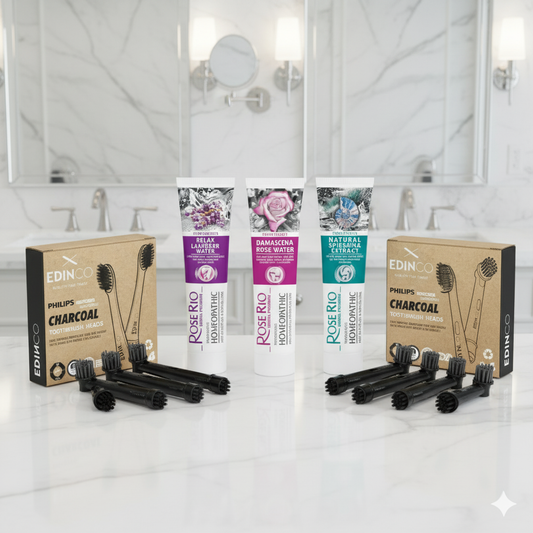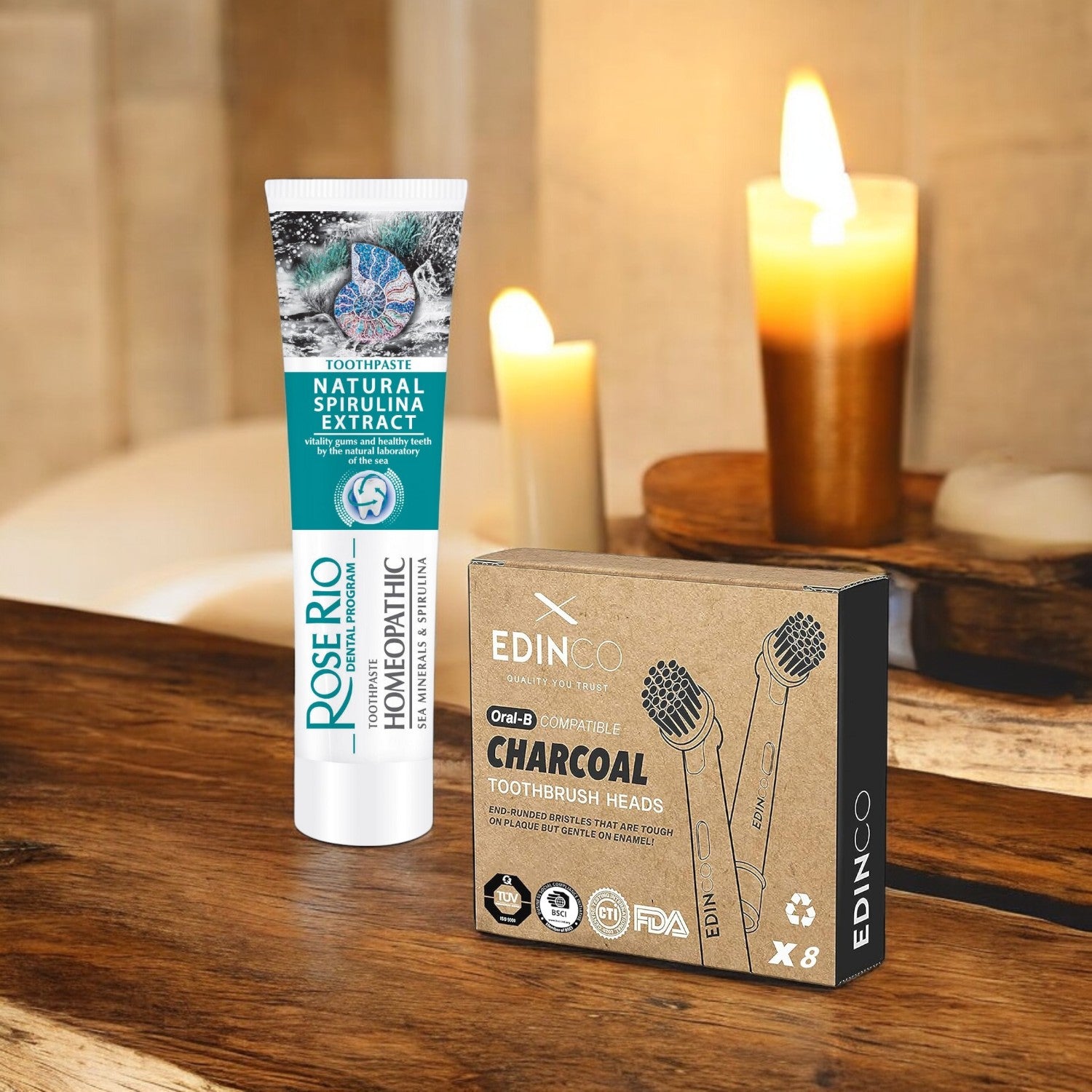What Should You Look for When Buying Biodegradable Floss?
Table of Contents
Flossing is a daily part of oral health, and traditional nylon and Teflon (PTFE) floss won't go away, adding millions of miles of non-biodegradable waste to the landfills in a single year. Well, in the case of the eco-conscious consumers, a change to a truly biodegradable dental floss would become a key in achieving a sustainable zero-waste-based oral health care routine.
The challenge that comes with this choice though, is how do you distinguish between true sustainability and false claims? British-company brand Edinco is an evidence-based, science-supported alternative that we can support with our motto: Everyday healthcare without everyday waste. Below is an authoritative guide on what to look for when investing in truly sustainable dental floss in the UK.
Why Does Dental Floss Need to Be Biodegradable in the First Place?
The need for biodegradable floss is driven entirely by the massive scale of plastic waste generated by conventional oral care products. Traditional floss presents a significant environmental hazard that lasts for generations.
How much waste does traditional floss contribute to landfill annually?
The sheer volume of traditional floss discarded globally is staggering. A single roll of floss contains dozens of meters of material. When multiplied by millions of daily users, this equates to thousands of tonnes of material destined for landfill or, worse, entering our waterways. Because nylon and PTFE are often bundled with non-recyclable plastic casings, the entire product contributes to the escalating plastic crisis.
How long does nylon or PTFE floss take to decompose?
Nylon and PTFE (the material often used in high-performance glide floss) are forms of plastic. These materials are estimated to take hundreds of years to fully decompose. Instead of breaking down, they merely fragment into smaller and smaller pieces—microplastics—which pollute the soil, oceans, and air, ultimately re-entering the food chain. This is why transitioning to materials that safely return to the earth is paramount to achieving a circular economy in the bathroom.
What’s the environmental impact of floss packaging?
Beyond the thread itself, the packaging is often a major sustainability fail. Most drugstore floss comes encased in non-recyclable, mixed-plastic containers. The most sustainable options ensure the floss is protected in materials that are easily recyclable (like glass, metal, or durable cardboard) and that the refill packaging is minimal and compostable.
See how Edinco reduces oral care waste and supports the circular economy: See how Edinco reduces oral care waste →
What Materials Are Truly Biodegradable in Floss?
When shopping for zero-waste dental floss, the material of the thread is the most important factor. Only natural fibers or certain biopolymers can claim genuine biodegradability.
Is silk the only natural biodegradable floss material?
Silk floss is the gold standard for natural biodegradability. It is a natural fiber floss that is strong, naturally breaks down into its organic components, and is fully compostable. However, for eco-conscious or vegetarian consumers, two ethical considerations arise:
-
Sourcing: Silk is derived from silkworms, making it non-vegan.
-
Coatings: Ensure the silk is coated with a natural wax (like Candelilla or natural beeswax) and not synthetic PTFE.
What about corn-based PLA floss, is it compostable at home?
Floss made from PLA (polylactic acid), a polymer derived from plant starches like corn, is often marketed as compostable. However, it’s vital to understand the difference between commercial and home composting. Most PLA requires the high, sustained temperatures of an industrial composting facility to break down effectively. If placed in a typical garden compost heap, it may linger for years. Always read the label to verify that the product is certified-home-compostable to ensure true zero-waste convenience.
How do you determine whether the floss you are purchasing is plastic free?
The easiest solution is to seek conspicuous labelling and certifications. Natural fiber or plant-based is not a sufficient term. The floss needs to be clearly stated as 100% silk or certified PLA, bamboo or some other clearly defined biopolymer. When the substance is listed as nylon, PTFE or polyethylene, it is plastic and will not biodegrade safely.
What Do You Do to Greenwash When You Want to Buy Eco Floss?
The emergence of the green consumer has seen a growth of greenwashing or false advertising on the basis that a product or service is more beneficial to the environment. To the green consumer, transparency is of utmost importance.
What warning bells indicate a claim of biodegradation is not credible?
Watch out against statements such as eco-friendly, ocean-friendly, and less plastic. When a brand decides to state that a product is biodegradable but does not state what material is used (ex: silk, PLA), or the product is actually nylon in a paper box the fundamental problem of plastic waste is not solved. Environmental organizations such as Green Alliance UK argue that the core element of sustainability needs to be addressed, not only the marketing.
Which requirements must sustainable floss have?
Although not all dental flosses have been biodegraded certified, seek the following quality and safety guarantees:
-
Quality Standard: seek brands with internationally accepted product quality standards, including FDA, ISO and TUV certifications.
-
Ethical Sourcing: Inquire about clear statements on vetted ethical sourcing and manufacturing practices.
What does brand transparency and charitable impact mean?
An honest brand will post its mission and impact. More precisely, Edinco is a company with values of vetted ethical sourcing and its diverse philanthropic activities like helping established charities, tree planting, and recycling plastic bottles. A mission-first brand gives the assurance that the product is created with ethics at the core, rather than as a by-product.
Which Other Characteristics Are You to Expect in Ethical Floss?
Sustainability goes beyond biodegradability and includes the lifecycle of the product, including sourcing to disposal.
Is silk floss cruelty-free and vegan?
Silk is derived from silkworm so it is not vegan. If you are vegan, find plant-based options such as corn-based PLA or bamboo charcoal floss, and use a plant-based wax coating (such as Candelilla) instead of beeswax. A cruelty-free status also helps to verify that no animal testing is involved in development.
Is the packaging made of compostable paper, glass or recyclable metal?
The most environmentally-friendly floss will be in a reusable container, usually made of glass or metal, to be stored forever. Refills must be packaged in small, compostable material. This zero-waste packaging commitment finishes the circle economy model.
Is the floss sourced, manufactured or packaged with ethical labour?
To an environmentalist consumer, the health of individuals matters as much as the health of the Earth. Select brands with Ethical British and European manufacturing practices and transparency regarding their supply chain. We visit and audit our suppliers at Edinco to make sure they meet our quality requirements and are ethically sourced.
Get to know our ethical sourcing strategy and mission.
Does Natural Floss Work as Well as Conventional Floss?
In changing to natural fibre floss, it is again important to have the advantage of its plaque removal and gum disease prevention properties.
Are silk or PLA types of flosses as good as nylon floss?
Yes, absolutely. Floss can be effective regardless of the type of polymer utilized, as long as it can be slipped between teeth and scrape away plaque. Silk especially is very tensile and has a fibrous structure which is very efficient in sweeping away debris. The trick, as the NHS Oral Health Foundation points out, is the method and practice, rather than the substance.
What are the suggestions of dentists dealing with switching to natural flavored floss?
Dentists suggest keeping the same intensive practice: by sliding the floss between the teeth and curving it into C-shape one can clean the whole side of each tooth, not only the gap. When you notice that the texture or thickness is a bit different, keep on because you are helping your oral health with a proven clinically approach and a sustainable product that lasts a long time.
What are the clinical findings of the use of biodegradable floss?
Any kind of interdental cleaning is better than no oral health care as defined by the NHS Oral Health Foundation. Clinical research proves that the most effective method of gum disease and plaque formation prevention is regular, daily flossing. When you start doing it on a daily basis, there is no need to make a decision between a biodegradable dental floss and a non-biodegradable one because once you make a commitment to take care of your health, you should not jeopardize the health of the planet.
What Are The Questions to Ask Before Making a Purchase of Biodegradable Floss?
Check this list to filter through the marketing rhetoric and ensure that there is clear zero-waste policy:
-
Is this floss produced using 100 percent naturally derived materials? (Verifying silk or guaranteed vegetable matter.)
-
Can it be composted in residential or just in factories. (Determining what can be really composted at home.)
-
Does the packaging reuse or recycle? (Checking for glass, metal, or paper refills.)
-
Is the product sourced, designed, or proudly backed by a UK company? (Supporting local British company brands.)
-
Does the company contribute to environmental or social causes? (Verifying ethical mission and charitable impact.)
Where Can You Buy Verified Biodegradable Floss in the UK?
For the eco-conscious consumers in the UK, choosing a brand that integrates sustainability into every element, from product design to end-of-life recycling, is crucial.
What makes Edinco’s oral care range sustainably different?
While Edinco currently specializes in long-term oral care tools, our entire product ecosystem is built around the circular economy principle, using science-backed design. We offer a system where every component, from our recyclable charcoal toothbrush heads (with separate models for Oral-B and Philips Sonicare) to our naturally derived toothpaste (featuring ingredients like organic lavender and organic rose), is designed to minimise waste.
How does Edinco’s “Recycling Reward Scheme” reduce dental care waste?
Edinco solves the problem of difficult-to-recycle oral care waste with our robust Recycling Reward Scheme. It’s simple: you can send us almost any brand of used toothbrush heads, tubes, or packaging. We cover the postage fee and envelope cost as a voucher for your next purchase, rewarding your environmental effort. This scheme applies globally, allowing you to easily drop in the nearest post box worldwide to our recycling address. Customers get their reward instantly online upon uploading proof of postage.
Where can I read reviews from other eco-conscious buyers?
We have received excellent reviews from hundreds of verified reviews praising our commitment to quality, fast delivery, and ethical mission, reinforcing our position as a leader in sustainable, convenient solutions for the modern consumer.
Discover a fully sustainable oral care system: Browse Edinco Oral Care Range →
What’s the Future of Eco-Friendly Oral Care Beyond Floss?
The future of oral care is about comprehensive circular economy strategies that prevent waste from being created in the first place.
Are brands integrating circular economy strategies in dental care?
Yes. Leading brands are moving away from single-product sustainability (like one biodegradable floss thread) toward holistic systems. They are prioritizing reusable components (like electric toothbrush handles), bulk refills, and integrated take-back programs—exactly what the Edinco Recycling Reward Scheme achieves.
How does Edinco drive sustainable change through science-backed materials?
Edinco's commitment to science-backed materials and British design means we constantly pursue innovation. We focus on materials that offer the highest level of performance and the shortest decomposition time, proving that effective daily care does not require everyday waste.
Read more about the Edinco story and our commitment to sustainable innovation
Invest in Verified, Sustainable Oral Care. Because Your Smile—And the Planet—Deserve Better. Everyday healthcare without everyday waste.
FAQs
1. What makes dental floss biodegradable?
Biodegradable dental floss is made from natural materials like silk, bamboo fiber, or corn-based PLA that decompose naturally without harming the environment. Unlike traditional nylon floss, it breaks down over time, reducing plastic waste.
2. Is biodegradable floss as effective as regular floss?
Yes, biodegradable floss is just as effective at removing plaque and food particles between teeth. The key is using proper flossing technique and choosing high-quality, durable floss that doesn’t shred easily.
3. What materials should I look for in biodegradable floss?
Look for floss made from silk, bamboo fiber, or corn-based PLA coated with natural waxes like candelilla or beeswax. These ingredients ensure smooth gliding between teeth while remaining fully compostable.
4. How do I dispose of biodegradable floss properly?
You can compost most biodegradable floss made from 100% natural materials. However, always check the packaging — some may include small amounts of synthetic coating, which should be discarded in regular waste.


